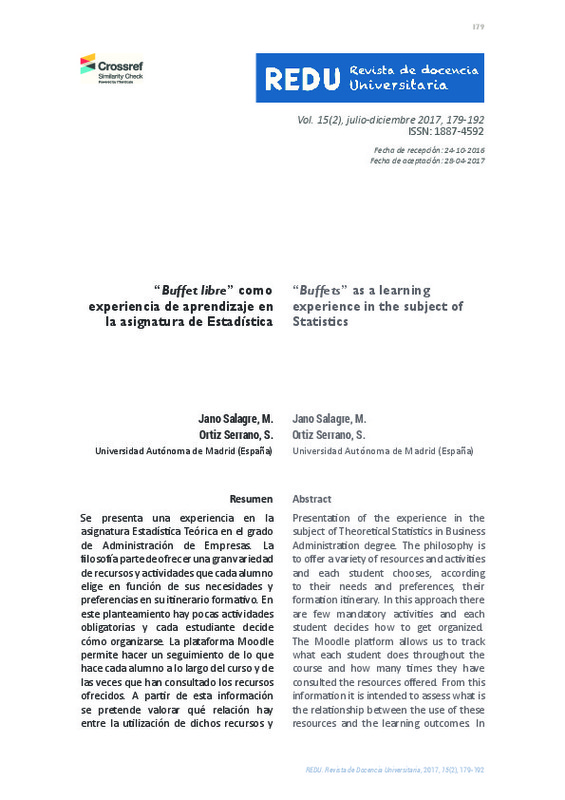|
[EN] Presentation of the experience in the subject of Theoretical Statistics in Business Administration degree. The philosophy is to offer a variety of resources and activities and each student chooses, according to their ...[+]
[EN] Presentation of the experience in the subject of Theoretical Statistics in Business Administration degree. The philosophy is to offer a variety of resources and activities and each student chooses, according to their needs and preferences, their formation itinerary. In this approach there are few mandatory activities and each student decides how to get organized. The Moodle platform allows us to track what each student does throughout the course and how many times they have consulted the resources offered. From this information it is intended to assess what is the relationship between the use of these resources and the learning outcomes. In this sense, this experience shows us that three different types of students can be identified with regards to the use of the resources placed at their disposal: A first group of students with little interest that do not make use of the resources, a second group that use the resources but with little advantage, and a third group that devotes time and effort in using the materials. By analyzing the academic results of these three groups, it is observed that students in the third group are those with a higher grades. This experience leads us to an important reflection, it is not sufficient to make the materials available to students, no matter how good these are and it is not enough that the students access them. The key is to propose activities that make them work and reflect on the materials.
[-]
[ES] Se presenta una experiencia en la asignatura Estadística Teórica en el grado de Administración de Empresas. La filosofía parte de ofrecer una gran variedad de recursos y actividades que cada alumno elige en función ...[+]
[ES] Se presenta una experiencia en la asignatura Estadística Teórica en el grado de Administración de Empresas. La filosofía parte de ofrecer una gran variedad de recursos y actividades que cada alumno elige en función de sus necesidades y preferencias en su itinerario formativo. En este planteamiento hay pocas actividades obligatorias y cada estudiante decide cómo organizarse. La plataforma Moodle permite hacer un seguimiento de lo que hace cada alumno a lo largo del curso y de las veces que han consultado los recursos ofrecidos. A partir de esta información se pretende valorar qué relación hay entre la utilización de dichos recursos y los resultados de aprendizaje obtenidos. En este sentido, esta experiencia nos muestra que son identificables tres tipos diferentes de estudiantes en lo que se refiere al uso de los recursos: un primer grupo de alumnos poco interesados que no hacen uso de los recursos, un segundo grupo que sí los utilizan pero con poco aprovechamiento y un tercer grupo que dedica tiempo y esfuerzo a la hora de utilizar los materiales. Al analizar los resultados académicos de estos tres grupos se observa que los alumnos del tercer grupo son los que presentan unas mejores calificaciones. Esta experiencia nos conduce a una reflexión importante, no es suficiente poner a disposición de los alumnos materiales, por muy buenos que sean y tampoco basta con que el alumno acceda a ellos. La clave está en proponer actividades que les haga trabajar y reflexionar sobre los materiales.
[-]
|








